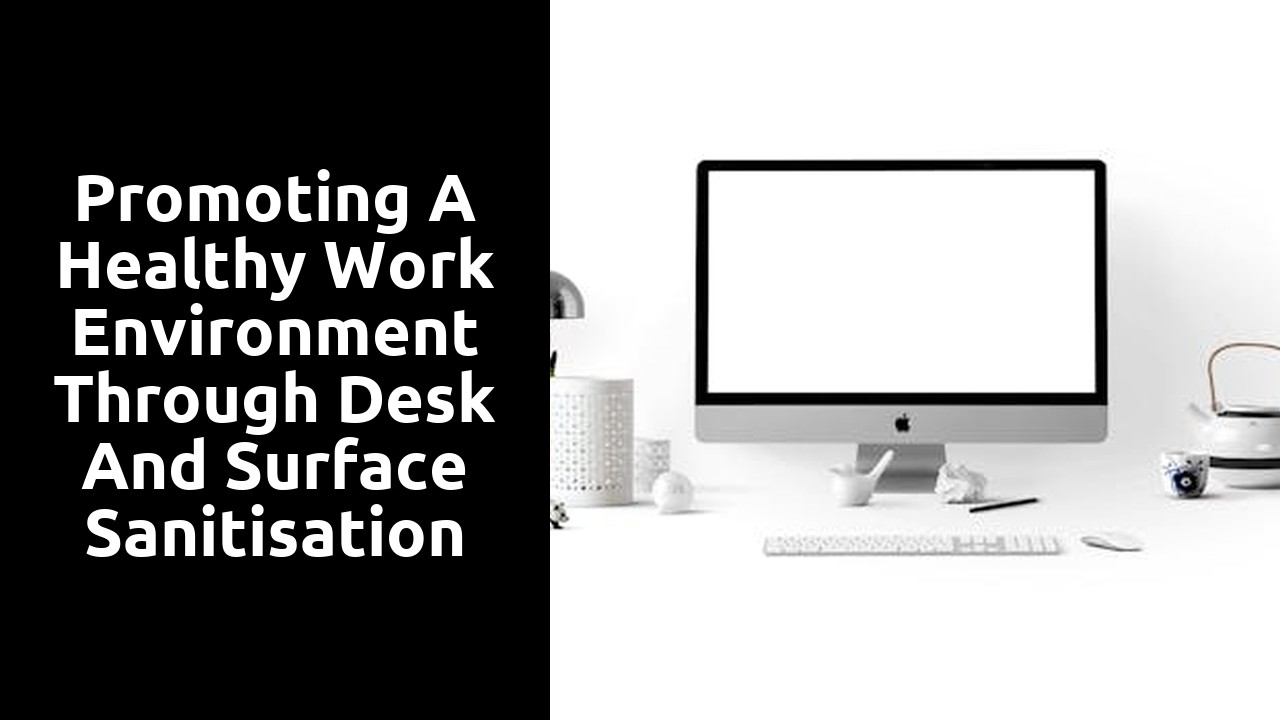Promoting a Healthy Work Environment Through Desk and Surface Sanitisation

Table Of Contents
Enhancing Employee Wellbeing Through Clean Workspaces
Maintaining a clean workspace is crucial for promoting the wellbeing of employees. A tidy desk not only enhances the physical environment but also contributes to a more positive and productive mindset among workers. Studies have shown that a clutter-free workspace can reduce stress levels and improve focus, leading to higher job satisfaction and overall wellbeing.
Furthermore, a clean workspace reduces the risk of illness and absenteeism among employees. Regular sanitisation of desks and surfaces can help prevent the spread of germs and bacteria, creating a healthier environment for everyone in the workplace. By prioritising cleanliness and hygiene in the office, employers can demonstrate their commitment to the health and wellbeing of their employees, ultimately contributing to a more positive and thriving work culture.
Monitoring and Maintaining Sanitisation Standards
Maintaining high sanitisation standards within the workplace is crucial for safeguarding the health and wellbeing of employees. Regular monitoring of cleanliness levels ensures that potential health risks are minimised, promoting a safe and hygienic environment for all staff members. By conducting routine checks and assessments of sanitisation practices, businesses can proactively address any areas that require improvement, thus preventing the spread of germs and illnesses among employees.
Furthermore, maintaining sanitisation standards not only benefits the health and safety of individuals in the workplace but also contributes to overall productivity and morale. A clean and sanitised environment fosters a sense of professionalism and care, boosting employee satisfaction and motivation. Implementing strict protocols for sanitisation and cleanliness demonstrates a commitment to creating a conducive work setting where employees can thrive and perform at their best, free from concerns about hygiene-related issues.
The Role of Desk Organisation in Maintaining Hygiene
Maintaining a clean and organised desk is essential for promoting hygiene in the workplace. Cluttered desks not only create a chaotic work environment but also serve as breeding grounds for germs and bacteria. By implementing a desk organisation system, employees can easily keep their workspaces clean and free from potential health hazards.
When desks are clutter-free, it becomes easier for cleaning staff to thoroughly sanitise the surfaces. Regular desk organisation allows for more efficient cleaning processes, reducing the risk of illnesses spreading among employees. Encouraging employees to declutter their desks at the end of each day can significantly contribute to maintaining a healthy work environment.
Decluttering for Efficient Cleaning Processes
Decluttering is a crucial aspect of maintaining a hygienic workspace. Simply put, the fewer items you have on your desk or surfaces, the easier it is to clean and disinfect them effectively. By reducing clutter, you are creating a more streamlined cleaning process, allowing for thorough sanitisation without any hindrances.
When decluttering, consider what items are essential and what can be stored away. Keep only the necessities on your desk to prevent dust build-up and to facilitate regular cleaning. A clean and organised workspace not only contributes to a healthier environment but also promotes a sense of clarity and focus, enhancing productivity and overall wellbeing.
Sustainability Considerations in Sanitisation Practices
As businesses strive to create healthier work environments, incorporating sustainable practices in sanitisation is paramount. Opting for eco-friendly cleaning agents can significantly reduce the carbon footprint of daily cleaning routines. By choosing environmentally-conscious products that are biodegradable and non-toxic, organisations can contribute to a greener future while maintaining high hygiene standards in the workplace.
Moreover, implementing sustainable sanitisation practices can also enhance the overall image and reputation of a company. Clients and employees increasingly value companies that prioritise sustainability and demonstrate a commitment to reducing environmental impact. By showcasing a dedication to eco-friendly sanitisation measures, businesses can attract like-minded individuals who align with their values and ethos.
EcoFriendly Alternatives for Cleaning Agents
When it comes to maintaining a clean and healthy work environment, opting for eco-friendly alternatives for cleaning agents can play a crucial role. Traditional cleaning products often contain harmful chemicals that can negatively impact both the environment and the health of employees. By choosing environmentally friendly cleaning agents, such as vinegar, baking soda, or citrus-based cleaners, organisations can promote sustainability and create a safer workspace for their staff.
Eco-friendly cleaning agents are not only gentler on the environment, but they are also beneficial for individuals with sensitivities to harsh chemicals. These natural alternatives are just as effective at eliminating germs and bacteria, ensuring that workspaces remain hygienic without compromising employee wellbeing. Additionally, embracing eco-friendly cleaning agents aligns with corporate social responsibility initiatives, demonstrating a commitment to sustainability and the wellbeing of both employees and the wider community.
FAQS
How often should desks and surfaces be sanitised in a work environment?
Desks and surfaces should be sanitised daily to maintain a healthy work environment and prevent the spread of germs.
What are some eco-friendly alternatives for cleaning agents?
Eco-friendly alternatives for cleaning agents include using vinegar, baking soda, and lemon juice, which are effective in sanitising surfaces without harming the environment.
Why is it important to declutter workspaces for efficient cleaning processes?
Decluttering workspaces is crucial for efficient cleaning processes as it enables thorough sanitisation and reduces the chances of bacteria and viruses hiding in cluttered areas.
How can employees contribute to maintaining sanitisation standards in the workplace?
Employees can contribute to maintaining sanitisation standards by regularly cleaning their own workspaces, following proper hand hygiene practices, and reporting any cleanliness concerns to the relevant authorities.
What role does desk organisation play in maintaining hygiene in the workplace?
Desk organisation plays a significant role in maintaining hygiene in the workplace as a clutter-free desk is easier to clean and reduces the risk of bacteria and viruses thriving in the workspace.
Related Links
Overcoming Common Challenges in Desk and Surface SanitisationUnderstanding the Impact of Desk and Surface Sanitisation on Employee Health